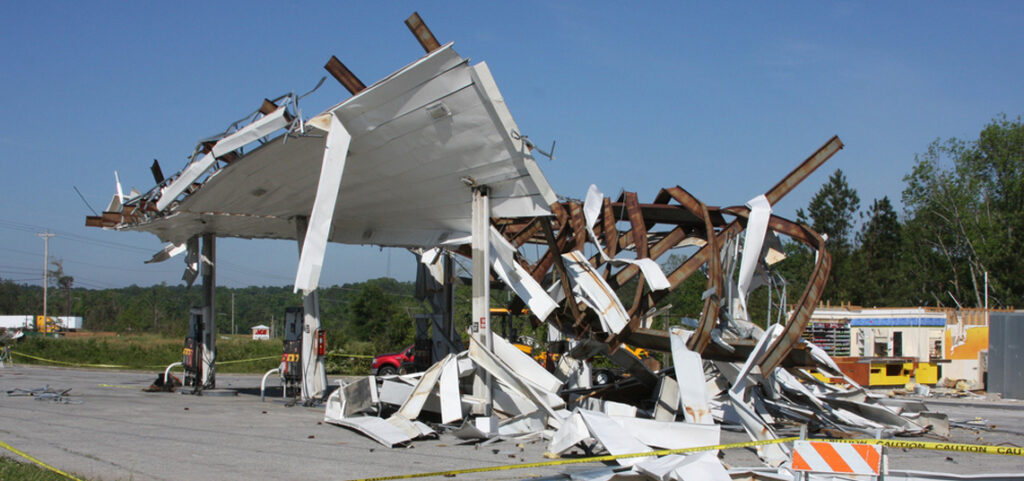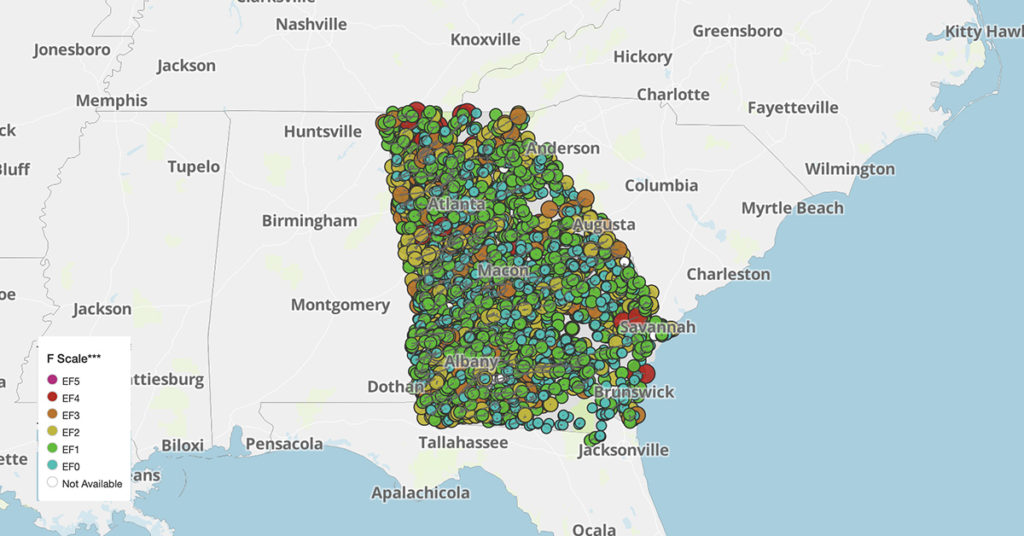Though it is not part of “tornado alley,” Georgia, being in the southeastern part of the United States is known for having a high frequency of tornadoes. Georgia averages about 20-30 tornadoes per year. The deadliest tornado in Georgia history occurred on March 27, 1973, when an F4 tornado struck the town of Adel, killing 18 people.
- The largest tornado outbreak in Georgia history occurred on April 27-28, 2011, when 48 tornadoes struck the state, killing 15 people and causing over $500 million in damage.
- The most tornado-prone area of Georgia is the northwestern part of the state, which is part of the so-called "Dixie Alley" tornado belt.
- Tornado season in Georgia typically runs from March through May, with a secondary peak in activity in November.
- Georgia's most recent significant tornado outbreak occurred on March 19, 2018, when a total of 15 tornadoes struck the state, causing extensive damage but no fatalities.
- Georgia's strongest tornado on record was an F4 that struck the city of Cairo on February 14, 2000, causing $7 million in damage but no fatalities.
Documented Georgia tornadoes since 1950

Know when severe weather is about to strike and when it's time for you to take shelter with our StormWarn texting program.

Preparing for Tornadoes in Georgia
Tornadoes are a serious threat to people and property in Georgia. With an average of 20-30 tornadoes per year and the potential for severe weather outbreaks, it is important for Georgians to be prepared in case of a tornado. Preparation can mean the difference between life and death.
One important aspect of tornado preparation in Georgia is having a plan in place for where to go and what to do in the event of a tornado. This plan should include identifying the safest location in your home or workplace, such as a basement or interior room on the lowest level, and practicing getting to that location quickly. It is also important to have a plan for communication with family members or coworkers in case of separation during a tornado.
Another important aspect of tornado preparation is staying informed about weather conditions and warnings. This can involve signing up for local weather alerts through text message or email, as well as monitoring weather forecasts and radar updates. There are also some great tools to get tornado alerts for your area, when your home is in danger. When a tornado warning is issued, it is crucial to take immediate action and seek shelter in the designated safe location.
Preparing for tornadoes in Georgia also means having an emergency kit with necessary supplies such as water, non-perishable food, a first aid kit, and a battery-powered radio. This kit should be easily accessible and regularly checked to ensure that supplies are up-to-date and in good condition.

Tornado Shelters Near Me in Georgia
You can check with your local news sources, such as TV or radio stations, as they may have information on public tornado shelters in your area.
It is important to note that while public tornado shelters can provide a safe place to seek shelter during a tornado, they may not be available or accessible in all situations. It is important to have a plan in place for sheltering in your own home or workplace, and to stay informed about weather conditions and warnings. The best case scenario is to have your own residential tornado shelter. If you are a business owner, or county official, consider your options for adding commercial tornado shelter space.
If you are unable to find a public tornado shelter in your area, or if it is not safe to travel to a shelter, seek shelter in the lowest level of a sturdy building, away from windows, and cover yourself with blankets or a mattress to protect yourself from flying debris.
Georgia Tornado Safety Tips
Tornadoes are a serious threat in Georgia, and it is important to take safety precautions in order to minimize the risk of injury or property damage.
Here are some tornado safety tips for Georgia:
Be prepared: Have a plan in place for where to go and what to do in the event of a tornado. Identify the safest location in your home or workplace, such as a basement or interior room on the lowest level, and practice getting to that location quickly. Have a communication plan with family members or coworkers in case of separation during a tornado.
Stay informed: Monitor local weather forecasts and radar updates, and sign up for local weather alerts through text message or email. When a tornado warning is issued, take immediate action and seek shelter in the designated safe location.
Seek shelter: If you are indoors when a tornado strikes, go to the lowest level of a sturdy building, away from windows. If possible, get under a sturdy piece of furniture or cover yourself with blankets or a mattress to protect yourself from flying debris. If you are in a mobile home or other vehicle, leave and seek shelter in a nearby building or ditch.
Avoid windows: Stay away from windows during a tornado, as they can shatter and cause injury. If you are unable to reach a safe location, get as low as possible and cover your head with your hands.
Stay put: Do not try to outrun a tornado in a car or on foot. Tornadoes can change direction quickly and are unpredictable. Seek shelter in the nearest safe location and wait until the storm has passed before moving.
Have an emergency kit: Keep an emergency kit with necessary supplies such as water, non-perishable food, a first aid kit, and a battery-powered radio. This kit should be easily accessible and regularly checked to ensure that supplies are up-to-date and in good condition.
By following these tornado safety tips, you can increase your chances of staying safe during a tornado in Georgia. It is important to take tornado threats seriously and prioritize preparedness in order to minimize the potential for harm.

Georgia Tornado Shelter FAQs
Q: Where can I find a tornado shelter in my specific county in Georgia?
A: You can contact your county emergency management agency or visit the Georgia Emergency Management and Homeland Security Agency (GEMA/HS) website for information on tornado shelters in your area.
Q: What is the capacity of the average tornado shelter in Georgia?
A: The capacity of tornado shelters in Georgia can vary greatly depending on location. It's possible that some could hold just a few dozen, but others up to 100 people.
Q: Are there any regulations for building a private tornado shelter in Georgia?
A: Yes, there are regulations for building a private tornado shelter in Georgia. You can contact your local building department for more information on the specific requirements.
Q: How do I know if a tornado shelter is up to code and safe to use in Georgia?
A: Tornado shelters in Georgia are typically inspected by the local building department to ensure they meet safety codes and standards. It's best to look for a vendor who is a member of the National Storm Shelter Association (NSSA) to ensure the shelter meets industry standards.
Q: Are there any businesses or public buildings required to have tornado shelters in Georgia?
A: There are currently no state regulations requiring businesses or public buildings to have tornado shelters in Georgia.
Q: How often are tornado shelters in Georgia inspected for safety and maintenance?
A: The frequency of tornado shelter inspections in Georgia can vary, but they are typically inspected on an annual basis by the local building department.
Q: How long can I expect to stay in a tornado shelter during a severe weather event in Georgia?
A: The length of time you may need to stay in a tornado shelter varies depending on the severity of the storm. You should be prepared to stay in the shelter for several hours if necessary. Those who have residential tornado shelters may choose to stay the night.
Q: Can I bring my pets with me to a tornado shelter in Georgia?
A: This can vary by shelter, but many shelters in Georgia do not allow pets. It's important to check with the shelter beforehand to determine their policy on pets.
Q: How accessible are tornado shelters for people with disabilities in Georgia?
A: Tornado shelters in Georgia are required to comply with the Americans with Disabilities Act (ADA) to ensure they are accessible to people with disabilities. However, it's important to check with the specific shelter beforehand to ensure it meets your individual needs.
Q: Do you have a question that’s not discussed here?
A: Please engage one of our knowledgeable reps! You can chat with one on the right side of the page!
Tornado Shelters Near Me in Georgia
In Georgia, public tornado shelters are typically designated by local emergency management agencies or county officials. The best place to find information on public tornado shelters in your area is by contacting the Georgia Emergency Management Agency or a city or county government office. They will have the most up-to-date information on the location of public shelters, as well as any specific guidelines or procedures for using them during a tornado. You can also check with your local news sources, such as TV or radio stations, as they may have information on public tornado shelters in your area.
It is important to note that while public tornado shelters can provide a safe place to seek shelter during a tornado, they may not be available or accessible in all situations. It is important to have a plan in place for sheltering in your own home or workplace, and to stay informed about weather conditions and warnings. The best case scenario is to have your own residential tornado shelter. If you are a business owner, or county official, consider your options for adding commercial tornado shelter space.
If you are unable to find a public tornado shelter in your area, or if it is not safe to travel to a shelter, seek shelter in the lowest level of a sturdy building, away from windows, and cover yourself with blankets or a mattress to protect yourself from flying debris.
Georgia Tornado Safety Tips
Tornadoes are a serious threat in Georgia, and it is important to take safety precautions in order to minimize the risk of injury or property damage.
Here are some tornado safety tips for Georgia:
Be prepared: Have a plan in place for where to go and what to do in the event of a tornado. Identify the safest location in your home or workplace, such as a basement or interior room on the lowest level, and practice getting to that location quickly. Have a communication plan with family members or coworkers in case of separation during a tornado.
Stay informed: Monitor local weather forecasts and radar updates, and sign up for local weather alerts through text message or email. When a tornado warning is issued, take immediate action and seek shelter in the designated safe location.
Seek shelter: If you are indoors when a tornado strikes, go to the lowest level of a sturdy building, away from windows. If possible, get under a sturdy piece of furniture or cover yourself with blankets or a mattress to protect yourself from flying debris. If you are in a mobile home or other vehicle, leave and seek shelter in a nearby building or ditch.
Avoid windows: Stay away from windows during a tornado, as they can shatter and cause injury. If you are unable to reach a safe location, get as low as possible and cover your head with your hands.
Stay put: Do not try to outrun a tornado in a car or on foot. Tornadoes can change direction quickly and are unpredictable. Seek shelter in the nearest safe location and wait until the storm has passed before moving.
Have an emergency kit: Keep an emergency kit with necessary supplies such as water, non-perishable food, a first aid kit, and a battery-powered radio. This kit should be easily accessible and regularly checked to ensure that supplies are up-to-date and in good condition.
By following these tornado safety tips, you can increase your chances of staying safe during a tornado in Georgia. It is important to take tornado threats seriously and prioritize preparedness in order to minimize the potential for harm.

Ways to locate public shelters in Georgia
When seeking emergency management information in Georgia, it's essential to rely on accurate and trustworthy resources.
Please contact your local emergency agencies and monitor local news and weather alerts regularly and ensure you're prepared with a disaster supply kit. Stay safe!


